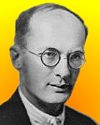 (source)
(source)
|
Bronislaw Malinowski
(7 Apr 1884 - 16 May 1942)
Polish-British anthropologist who is regarded as the father of the functional school of anthropology. He is noted for doing fieldwork (1914-18) living with the primitive island inhabitants of the Trobriand Islands, off the northeast coast of New Guinea.
|
Science Quotes by Bronislaw Malinowski (8 quotes)
[Magic] enables man to carry out with confidence his important tasks, to maintain his poise and his mental integrity in fits of anger, in the throes of hate, of unrequited love, of despair and anxiety. The function of magic is to ritualize man's optimism, to enhance his faith in the victory of hope over fear. Magic expresses the greater value for man of confidence over doubt, of steadfastness over vacillation, of optimism over pessimism.
— Bronislaw Malinowski
Magic, Science and Religion (1925), 90.
[W.H.R.] Rivers is the Rider Haggard of anthropology; I shall be the Conrad.
[Drawing parallel with popular novelists.]
[Drawing parallel with popular novelists.]
— Bronislaw Malinowski
Attributed. As quoted in Raymond Firth, Malinowski as Scientist and as Man (1964), 6. However, Michael W. Young in his biography found that Malinowski in fact (in a letter to Mrs. Seligman, 1918) wrote only a comment upon re-reading Rivers' Melenesians, that the book 'reads like Rider Haggard rather than Joseph Conrad. It is rather a pursuit of fact than of the philosophical importance of fact.' See Malinowski. Odyssey of an anthropologist, 1884-1920 (2004), 237.
Coastal sailing as long as it is perfectly safe and easy commands no magic. Overseas expeditions are invariably bound up with ceremonies and ritual. Man resorts to magic only where chance and circumstances are not fully controlled by knowledge.
— Bronislaw Malinowski
Culture (1931), 636.
In the field one has to face a chaos of facts, some of which are so small that they seem insignificant; others loom so large that they are hard to encompass with one synthetic glance. But in this crude form they are not scientific facts at all; they are absolutely elusive, and can be fixed only by interpretation, by seeing them sub specie aeternitatis, by grasping what is essential in them and fixing this. Only laws and gerneralizations are scientific facts, and field work consists only and exclusively in the interpretation of the chaotic social reality, in subordinating it to general rules.
— Bronislaw Malinowski
Baloma (1954), 238.
No sooner than I had begun to read this great work [Frasier, The Golden Bough], than I became immersed in it and enslaved by it. I realized then that anthropology, as presented by Sir James Frasier, is a great science, worthy of as much devotion as any of her elder and more exact sister studies, and I became bound to the service of Frazerian anthropology.
— Bronislaw Malinowski
In A. Kuper, Anthropologists and Anthropology: The Modern British School (1973), 23. Quoted in Michael W. Young, Malinowski: Odyssey of an Anthropologist, 1881-1920 (2004), 4.
The magnificent title of the Functional School of Anthropology has been bestowed on myself, in a way on myself, and to a large extent out of my own sense of irresponsibility.
— Bronislaw Malinowski
In A. Kuper, Anthropologists and Anthropology: The Modern British School (1983), 1.
The time when we could tolerate accounts presenting us the native as a distorted, childish charicature of a human being are gone. This picture is false, and like many other falsehoods, it has been killed by Science.
— Bronislaw Malinowski
Argonauts of the Western Pacific (1961), 83.
There are no peoples however primitive without religion and magic. Nor are there, it must be added at one, any savage races lacking in either the scientific attitude, or in science, though this lack has been frequently attributed to them.
— Bronislaw Malinowski
Magic, Science and Religion (1954), 17.
See also:
- 7 Apr - short biography, births, deaths and events on date of Malinowski's birth.
- Magic, Science and Religion and Other Essays, by Bronislaw Malinowski. - book suggestion.
 In science it often happens that scientists say, 'You know that's a really good argument; my position is mistaken,' and then they would actually change their minds and you never hear that old view from them again. They really do it. It doesn't happen as often as it should, because scientists are human and change is sometimes painful. But it happens every day. I cannot recall the last time something like that happened in politics or religion.
(1987) --
In science it often happens that scientists say, 'You know that's a really good argument; my position is mistaken,' and then they would actually change their minds and you never hear that old view from them again. They really do it. It doesn't happen as often as it should, because scientists are human and change is sometimes painful. But it happens every day. I cannot recall the last time something like that happened in politics or religion.
(1987) -- 


